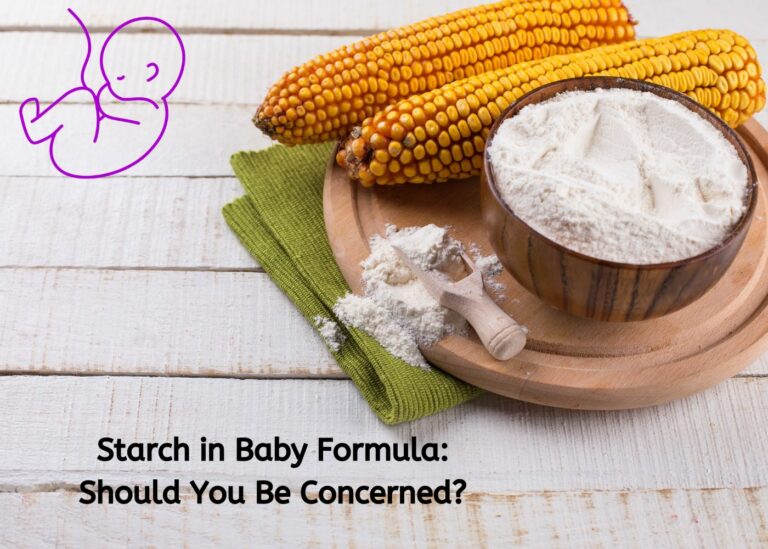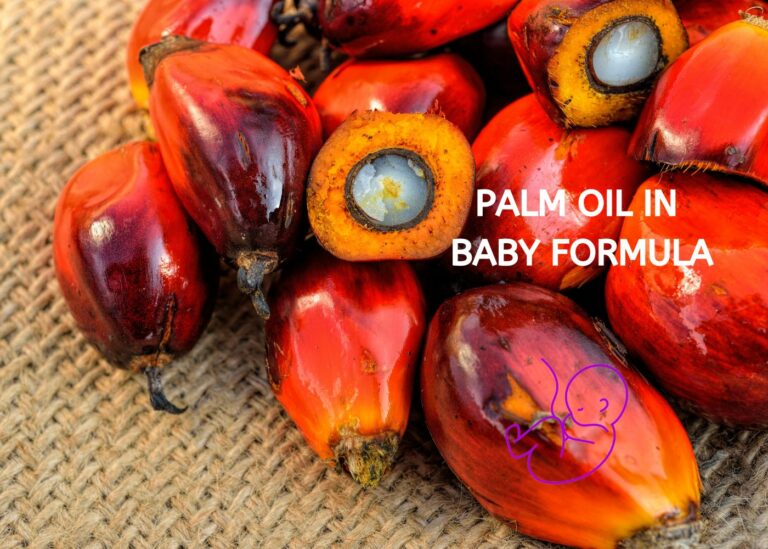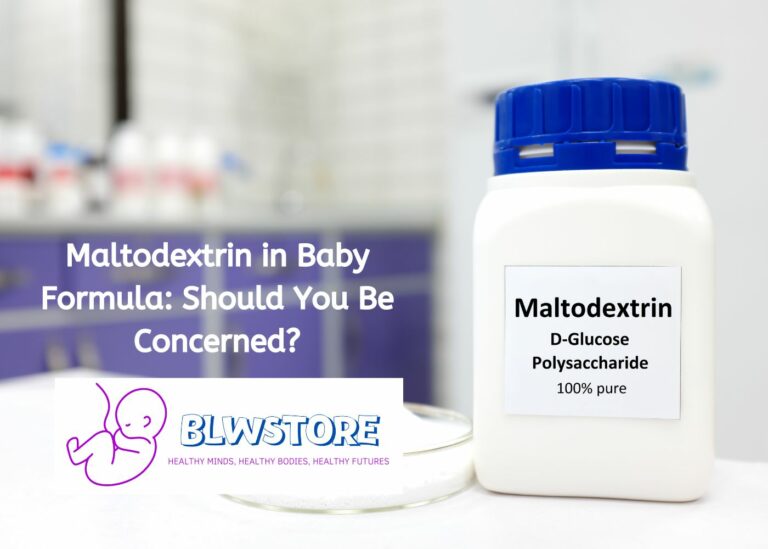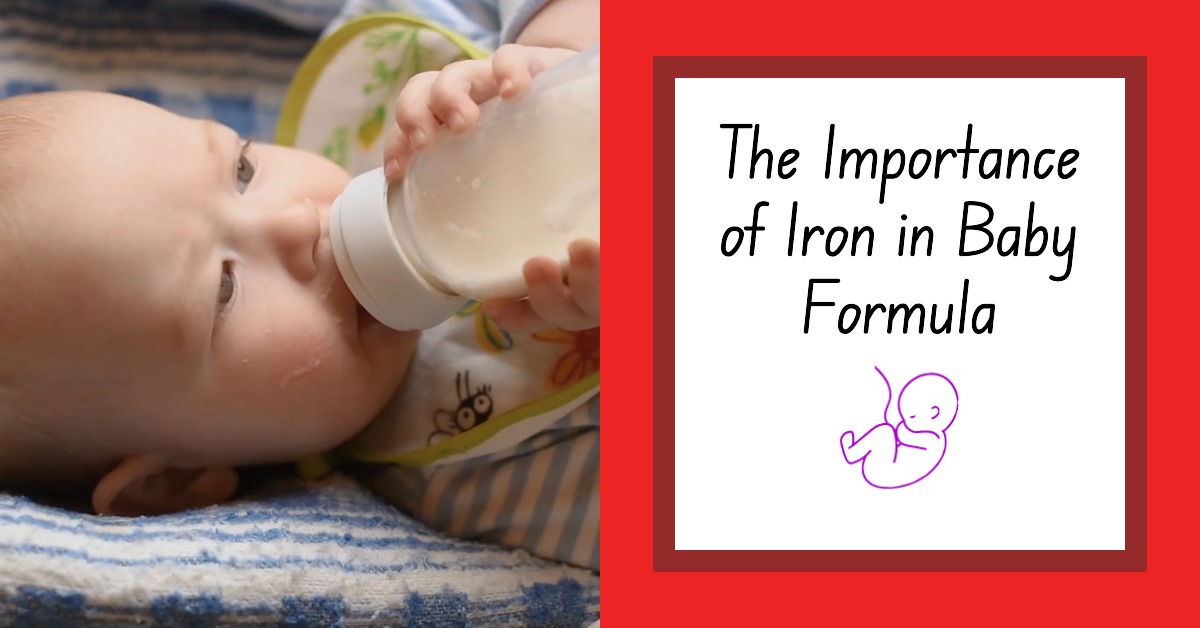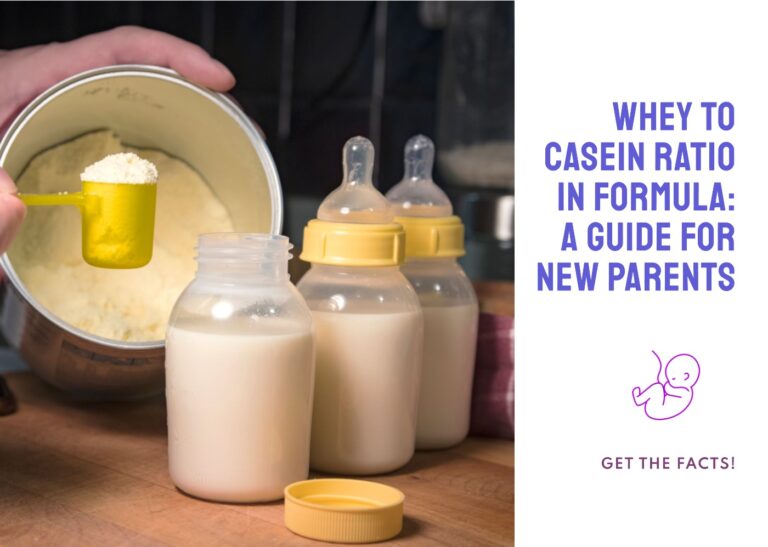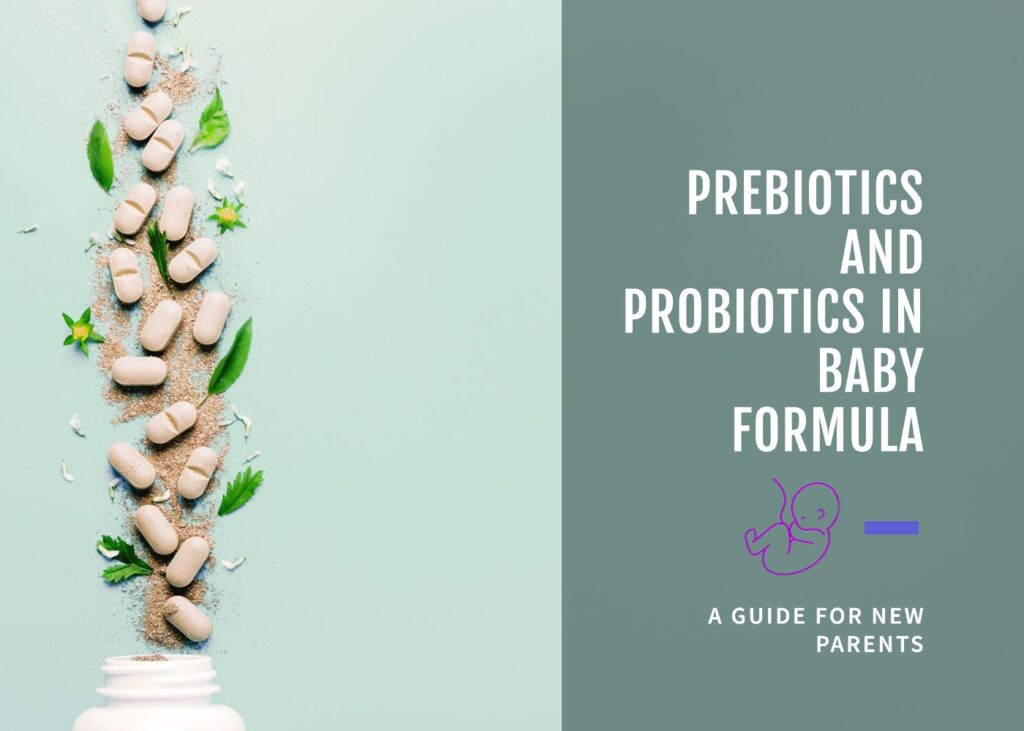
Key Takeaways. Prebiotics and Probiotics in Baby Formula
Key Takeaways Actions/Considerations Prebiotics and probiotics in infant formula can aid digestion For a baby with no significant digestive issues, consider a formula without additives or one enriched with natural prebiotics like HMOs or GOS There’s a variety of prebiotics in infant formulas Most natural prebiotics: HMOs, FOSs, GOSs, and PDX. HMOs are the most natural, and PDX the least Probiotics can boost gut health and immunity Only consider a probiotic-enriched formula if your baby has digestive problems and it’s recommended by a pediatrician Potential risks of prebiotics and probiotics include bloating, diarrhea, allergic reactions, and imbalances in gut bacteria Monitor your baby’s reaction to the formula and consult a pediatrician if any issues arise The probiotics industry is not tightly regulated Ensure you’re choosing a trusted and tested product when it comes to probiotics Other ways to improve formula digestibility include opting for goat milk formulas, checking the whey-to-casein ratio, and avoiding certain ingredients Tailor the choice of formula to your baby’s specific needs and consider these alternatives if needed Every baby is unique, and there’s no one-size-fits-all solution Always consult with your pediatrician for personalized advice and guidance based on your baby’s specific health needs
This post aims to give new parents the information they need about prebiotics and probiotics to make a more informed decision about the formula they want to give their baby.
Let’s get after it!
*Read: Best Formulas With Prebiotics and Probiotics
Our short answer and experience
Prebiotics and probiotics are supplemental ingredients incorporated into infant formulas to enhance their digestibility.
Reflecting on our personal experience and practices, if your baby exhibits no notable digestive issues, we recommend a formula containing no additives or the most natural prebiotics, like HMOs or GOS. (Kendamil or Bobbie formulas are the perfect options for this particular case)
However, if your infant struggles with digestive problems and your pediatrician advises a formula enriched with probiotics, then, and only then, should you consider purchasing a probiotic-inclusive formula.
In addition to this, there are other options available to increase the digestibility of formulas without resorting to prebiotics or probiotics, such as:
Opting for goat milk formulas, as goat milk is often easier to digest compared to cow’s milk.
Checking the Whey to Casein ratio: an ideal ratio is 60:40.
Evading ingredients such as palm oil, maltodextrin, and starch (this applies only if your baby can readily digest lactose).
As is often the case in life, the best choice will depend on your baby’s specific needs. There isn’t a one-size-fits-all solution.
Prebiotics In Infant Formula
Prebiotics are non-digestible fibers that promote the growth of good bacteria in a baby’s gut.
They improve digestion and can be found in breast milk, FOS, GOS, HMOs, and PDX.
While they offer benefits, potential risks include bloating and diarrhea.
Definition Of Prebiotics
Prebiotics are non-digestible fibers that fuel the beneficial bacteria living in your baby’s gut. Naturally occurring in certain fruits, vegetables, and grains — such as bananas, onions, garlic, and oats — these fibers pass through the digestive system without breaking down.
Once they reach the colon, they are fermented by good bacteria like Bifidobacteria and Lactobacilli.
In infant formulas containing prebiotics, these fibers often come from sources such as oligosaccharides found in breast milk. By incorporating them into formula options for babies who may not be able to receive breast milk exclusively or at all, manufacturers aim to replicate some of the health benefits associated with breastfeeding.
Role Of Prebiotics In Infant Health
Prebiotics are important for infant health as they help good bacteria grow in the gut, which improves digestion.
In a baby’s developing gut, prebiotics provide essential food for friendly bacteria, helping to maintain a healthy balance.
Research suggests that adding prebiotics to infant formula can benefit premature or low birth-weight babies. These babies often need extra support for their sensitive digestive systems, and including proven prebiotics like GOS or FOS could be helpful.
For example, a study found that adding specific prebiotics to formula led to more regular bowel movements and increased frequency of defecation, similar to breastfed babies with healthier gut bacteria compared to formula-fed babies.
Types Of Prebiotics Found In Infant Formula
Fructo-oligosaccharides (FOSs) are sweet and low-calorie substances used in many food products. They are not digested in the upper digestive system but reach the colon. There, they nourish beneficial bacteria like bifidobacteria and lactobacilli, which are important for a healthy gut.
Galacto-oligosaccharides (GOSs) are non-digestible carbohydrates that reach the colon and are fermented by beneficial gut bacteria. GOSs promote the growth of helpful bacteria and improve gut health. You can find them in dairy products and beans.
Human Milk Oligosaccharides (HMOs) are a significant component of human milk, acting as prebiotics in the infant’s gut. They help feed beneficial bacteria and support the immune system. Although not from human milk, some infant formulas contain a similar type of HMO called 2′-Fucosyllactose (2′-FL HMO).
Polydextrose (PDX): PDX is a dietary fiber that nourishes beneficial bacteria in the large intestine. It is present in baked goods, nutrition bars, and yogurt. PDX helps maintain a balanced gut environment by promoting the growth and activity of beneficial bacteria.
| Prebiotic | Naturalness |
|---|---|
| Human Milk Oligosaccharides (HMOs) | Most natural, found in breast milk |
| Fructo-oligosaccharides (FOSs) | Natural, derived from plants |
| Galacto-oligosaccharides (GOSs) | Natural, found in dairy products and beans |
| Polydextrose (PDX) | Less natural, synthetic dietary fiber |
| Rank | Prebiotic |
|---|---|
| 1 | Human Milk Oligosaccharides (HMOs) |
| 2 | Fructo-oligosaccharides (FOSs) and galacto-oligosaccharides (GOSs) (Tied) |
| 4 | Polydextrose (PDX) |
Potential Risks Or Side Effects Of Prebiotics In Infant Formula
While prebiotics can offer many benefits to babies, it is essential to consider potential risks when choosing infant formula.
Some infants experience adverse effects such as bloating or diarrhea after consuming prebiotic-enriched formula.
Additionally, a lack of long-term safety data means no certainty about the consequences of using these products for extended periods.
However, research has shown that supplementation with certain prebiotics (such as FOS or GOS) in moderate amounts does not cause significant negative side effects in most infants, making them an attractive option for promoting gut health and immunity.
Probiotics In Infant Formula
Probiotics are live microorganisms that promote a healthy gut and support the immune system.
Lactobacilli and Bifidobacteria are commonly used and have proven benefits, but there are potential risks, such as overgrowth of harmful bacteria and allergic reactions.
Definition Of Probiotics
Probiotics are live microorganisms that, when consumed in adequate amounts, can provide health benefits to the host. In infant formula, probiotics help promote a bacterial balance in the baby’s gut and support their immune system.
These microorganisms can include strains of Lactobacillus or Bifidobacterium bacteria, commonly found in breast milk and extensively studied for their health benefits.
Role Of Probiotics In Infant Health
Probiotics play a crucial role in infant health by promoting the balance of good bacteria in their gut microbiome. Probiotic strains such as lactobacillus and bifidobacterium support digestive health, improve nutrient absorption, and may even reduce the risk of developing gastrointestinal disorders like colic or reflux.
Additionally, probiotics have been shown to enhance immune system development and protect against harmful pathogens that could cause infections. Studies also suggest that supplementing with probiotics added to powdered infant formula can decrease antibiotic resistance and the incidence of diarrhea in formula-fed infants.
Types Of Probiotics Found In Infant Formula
Lactobacilli: Lactobacilli are one of the most commonly used probiotics. They are found in a variety of fermented foods and are frequently used in probiotic supplements.
Bifidobacteria: Bifidobacteria are also commonly used as probiotics and are one of the major genera of bacteria in the gut flora of mammals. They are often included in probiotic supplements and are known for their beneficial effects on gut health.
Streptococcus: Certain strains of Streptococcus, such as Streptococcus thermophilus, are used in the production of yogurt and other fermented dairy products. While not as widely used as Lactobacilli and Bifidobacteria, they still have a significant presence in the probiotic market.
Saccharomyces boulardii: Saccharomyces boulardii is a yeast-based probiotic that has been found effective in treating various types of diarrhea. While not as commonly known or used as the bacterial probiotics mentioned above, it is still recognized for its therapeutic benefits.
| Probiotic | Naturalness | Ranking (Based on Common Use) |
|---|---|---|
| Lactobacilli | Natural, commonly found in fermented foods | 1st |
| Bifidobacteria | Natural, part of gut flora in mammals | 2nd |
| Streptococcus | Mixed, some strains are beneficial and commonly used in yogurt | 3rd |
| Saccharomyces boulardii | Natural yeast | 4th |
Potential Risks Or Side Effects Of Probiotics In Infant Formula
While probiotics can have many benefits for babies, there are also potential risks and side effects associated with their use in infant formula. Some studies have shown that the excessive consumption or prolonged use of probiotics may lead to an overgrowth of harmful bacteria, which could cause diarrhea and other gastrointestinal problems.
Additionally, some infants may be allergic to certain strains of probiotics or experience adverse reactions such as rashes or hives.
Should You Consider Infant Formula With Prebiotics And Probiotics?
Consider infant formula with prebiotics like HMOs, such as Kendamil.
Probiotics can benefit babies with digestive issues. However, not all babies require them.
Consult a pediatrician for guidance based on your baby’s specific needs.
Yes, you should consider infant formula with prebiotics and probiotics, but their inclusion largely depends on your baby’s health needs.
Prebiotics are commonly found in infant formulas and are generally beneficial, especially HMOs. Kendamil is one of the few formulas that include this prebiotic. *Read: Kendamil Review
Probiotics, however, are not as common in formulas but can benefit babies experiencing digestive issues, such as colic or irregular bowel movements.
It’s crucial to note that while these ingredients can be beneficial, they are not necessary for all babies. Many infants thrive on formulas without added prebiotics or probiotics. Always consult with your pediatrician before deciding, as they can provide guidance based on your baby’s specific health needs and circumstances.
Are There Any Risks In Choosing Infant Formula With Prebiotics And Probiotics?
Potential risks of adding prebiotics and probiotics to formula include allergic reactions, unsettled stomach, infection risk, gut bacteria imbalance, and lack of regulation.
We recommend waiting until 6 months unless recommended by a pediatrician before including probiotics.
Consider other factors like whey-to-casein ratio and milk type.
While many studies have shown the potential benefits of adding prebiotics and probiotics to baby formula, there are also potential risks and side effects, as we mentioned before, particularly for certain groups of babies.
Allergic Reactions: Babies can react to anything new in their diet, including prebiotics or probiotics.
Unsettled Stomach: Some babies may experience gas, bloating, or diarrhea when they first start taking a formula with prebiotics or probiotics.
Infection Risk: While rare, there have been cases where the probiotics caused infections, particularly in children with compromised immune systems.
Imbalance of Gut Bacteria: While prebiotics and probiotics aim to promote a healthy balance of gut bacteria, there’s a risk that they could instead lead to an imbalance, potentially leading to long-term digestive issues.
Unregulated Industry: The probiotics industry is not tightly regulated, meaning the quality, purity, and concentration can vary widely between products.
If you have a baby without digestive problems, we recommend waiting until the 6-month mark before even considering including probiotics in your baby’s formula unless your pediatrician has recommended you to do so.
Take into account that there are other possible solutions to possibly improve your baby’s tolerance to formula, like the whey-to-casein ratio, the source and type of the ingredients, and the type of milk. (Goat’s milk formulas are easier to digest than cow’s)
Conclusion
Adding prebiotics and probiotics in infant formula can aid in enhancing digestibility.
Our recommendation?
For infants without significant digestive issues, opt for a formula free from additives or one enriched with natural prebiotics like HMOs or GOS.
If your infant experiences digestive problems, a probiotic-enriched formula, recommended by your pediatrician, could be the answer.
Don’t forget options such as goat milk formulas, a balanced whey-to-casein ratio, and avoiding certain ingredients can also improve formula digestibility.
As always, the best approach depends on your baby’s unique needs—there’s no universal solution.
Share your comments and experiences with us and comment below!
We’re Maria and Alberto, a married couple and educators who are nutrition enthusiasts. Even before we had kids, we were already crazy about nutrition.
We’d read scientific articles, watch videos from nutritionists, and spend hours listening to nutrition podcasts.
Today, we continue doing this, but in a different way, as we’ve learned to sift through the noise and trends. Nutrition, like any other field of knowledge, the more you read and learn, the more you develop a comprehensive understanding of reality, and that’s what has happened to us.
Before having our first child, we focused on learning everything we could about child nutrition, using the same techniques we had already employed, backed by our extensive knowledge in nutrition.
Our mission is to help other parents with their children’s nutrition, to help them become the best versions of themselves.
If we are what we eat and drink, which is absolutely true, let’s do it right!



